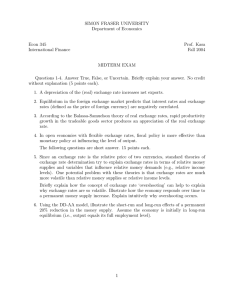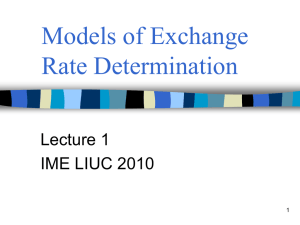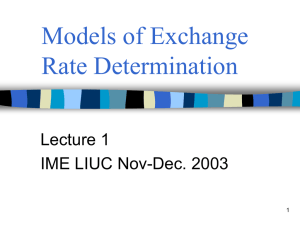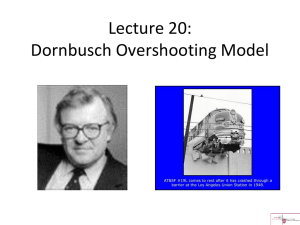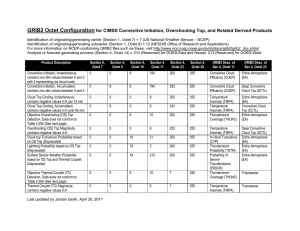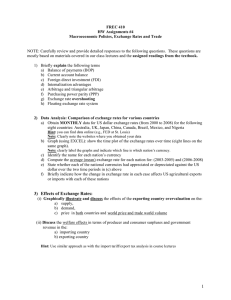Modeling the Overshooting Effect for CMOS - ASP
advertisement
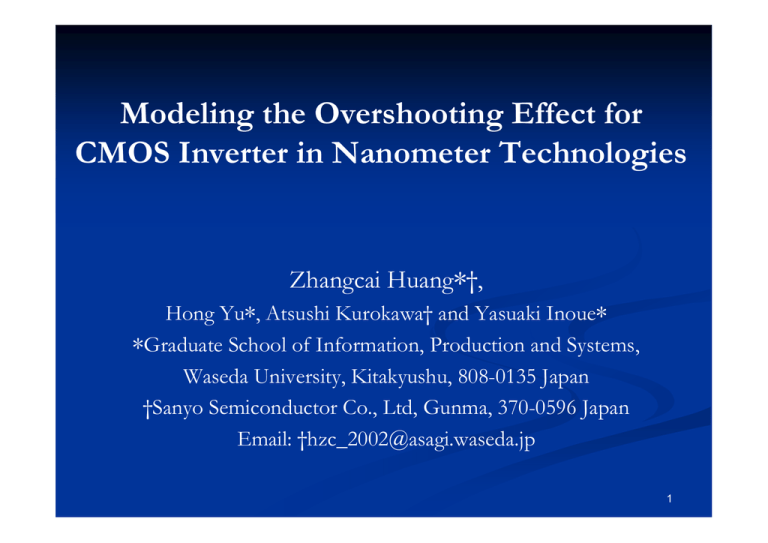
Modeling the Overshooting Effect for CMOS Inverter in Nanometer Technologies Zhangcai Huang∗†, Hong Yu∗, Atsushi Kurokawa† and Yasuaki Inoue∗ ∗Graduate School of Information, Production and Systems, Waseda University, Kitakyushu, 808-0135 Japan †Sanyo Semiconductor Co., Ltd, Gunma, 370-0596 Japan Email: †hzc_2002@asagi.waseda.jp 1 Outline Background Analytical expressions for overshooting effect Considering process variation Simulation results Conclusions 2 Outline Background Analytical expressions for overshooting effect Considering process variation Simulation results Conclusions 3 The differential equation for the CMOS inverter PMOS Ip ICM Vin ICL Vout CM The input voltage for the falling input ramp is expressed as In NMOS “CM is known as the Miller effect, but is seldom of importance in digital circuits. It is, however, of major importance in analog circuits.” Principles of CMOS VLSI Design: A Systems Perspective I. Background 1 t D = t50 − tin 2 1 t D = t ov + t r − t in 2 For traditional process technologies, the effect of overshooting is very small and can be neglected 5 I. Background The influence of overshooting time on timing analysis tr and td decrease much faster than tov with the increasing of gate sizes. And tov is equal to or larger than tr. With the scaling of technology process, tov becomes much important for delay time. 6 I. Background The influence of overshooting time on power analysis Short-circuit power consumption The overshooting time is one important parameter for power consumption estimation. 7 I. Background Conventional models for overshooting time The overshooting time is neglected The overshooting time is assumed as simple value empirical expressions tov=0. tov = (Vt/Vdd)tin J. L. Rossell, …“Charge-based analytical model for the evaluation of power consumption …”, TCAD 2002. 8 Outline Background Analytical expressions for overshooting effect Considering process variation Simulation results Conclusions 9 300 250 PMOS 200 Ip Charging period ICM ICL Current (uA) 150 100 50 IL(tov) Discharging period Q2 CM 0 In NMOS t Q1 tov vmin −50 −100 0 20 40 60 Times (ps) 80 100 120 II. Proposed Model PMOS Ip ICL ICM ICM Vin Vout In In NMOS V out (t ) = d V in dt VˆG S − V T H N CM βn ( ) CL ICL β n (VˆG S − V T H N ) ⎤ ⎡ − CL +CM ⎢1 − e ⎥ ⎢ ⎥ ⎣ ⎦ II. Proposed Model 300 700 250 600 200 500 Charging period 400 Current (uA) Current (uA) 150 100 50 IL(tov) Discharging period Q2 I p 300 200 I n 100 t Q tov vmin 1 t tp 0 ov 0 t −50 vmin −100 −100 0 20 40 60 Times (ps) 80 100 120 0 20 40 60 80 100 120 Times (ps) 12 II. Proposed Model Minimum overshooting time The overshooting time has minimum values. t D = t ov + t r − 1 t in 2 Minimum delay > Minimum overshooting time 13 Outline Background Analytical expressions for overshooting effect Considering process variation Simulation results Conclusions 14 III. Considering Process Variation In recent technologies, the variability of circuit performance due to the process variation has become a significant concern. As process geometries continue to shrink, the evaluation for critical device parameters is becoming more and more difficult due to the significant variations The sensitivities of the overshooting time with respect to the variation sources. With respect to the variation of length. With respect to the variation of threshold voltage. 15 III. Considering Process Variation t D = t ov 1 + tr − t in 2 Variation of L has no influence on the overshooting time. Variation of L has the influence only on the rising time. Variation of L has significant influence on the gate delay. D. Sinha, …“Gate Sizing Using Incremental Parameterized Statistical Timing Analysis” ICCAD-2005 16 III. Considering Process Variation 1. With input time decreases, the influence due to the Tox decreases greatly. 2. The influence due to L is 0. 3. With the scaling of process technologies, the variation of Vt increases, the influence due to Vt will increase greatly. International Technology Roadmap for Semiconductors (ITRS) 2005. 17 Outline Background Analytical expressions for overshooting effect Considering process variation Simulation results Conclusions 18 IV. Simulation Results J.L. Rossell: “Charge-based analytical model for the evaluation of power consumption in submicron CMOS buffers”, TCAD 2002. 19 IV. Simulation Results J.L. Rossell: “Charge-based analytical model for the evaluation of power consumption in submicron CMOS buffers”, TCAD 2002. 20 Outline Background Analytical expressions for overshooting effect Considering process variation Simulation results Conclusions 21 V. Conclusions The input-to-output coupling capacitance has been proved to has significant influence on CMOS gates: timing analysis and power analysis. The overshooting time has become one of main parts of gate delay. The analytical model for overshooting time is derived. 1. The overshooting time has minimum value 2. Gate delay cannot be smaller than this minimum value. Considering process variation: 1. The variation due to L has the influence only on output rising time, but has almost no influence on overshooting time. 2. The variation due to Vt has the most significant influence on overshooting time with the scaling of technologies. 22 Thank you for your attentions 23
